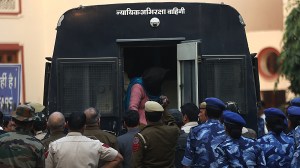High Court dismisses plea for re-evaluation in Haryana judicial exam case
Punjab and Haryana High Court upheld the evaluation process, saying there were no grounds for interference
 The candidate, who had applied in the Scheduled Caste category, had secured 493.10 marks but fell short of the cut-off of 495 marks. (Express File/Representational Image)
The candidate, who had applied in the Scheduled Caste category, had secured 493.10 marks but fell short of the cut-off of 495 marks. (Express File/Representational Image) The Punjab and Haryana High Court Friday dismissed a petition filed by a candidate who had challenged the evaluation of her answer in the Haryana Civil Service (Judicial Branch) Examination 2023-24 and sought re-evaluation. The bench, comprising Chief Justice Sheel Nagu and Justice Sumeet Goel, ruled that the existing prohibition on re-evaluation in Clause 33 of the recruitment advertisement was valid and did not violate constitutional principles.
The candidate, who had applied in the Scheduled Caste category, had secured 493.10 marks but fell short of the cut-off of 495 marks. She argued that her answer to one of the English questions was wrongly marked as incorrect, which prevented her from qualifying. The petitioner contended that her response was grammatically correct and aligned with standard English usage, citing opinions from language experts and online sources.
However, the court ruled that the petitioner had participated in the selection process with full knowledge of the rules and could not challenge them after an unfavourable outcome. It cited the principle of ‘estoppel’, stating that a candidate “cannot accept the benefits of a process while simultaneously disputing its validity.”
Addressing the issue of judicial interference in academic evaluations, the bench held that courts must exercise “utmost restraint” and should not function as “super-evaluators, supplanting their view for that of the examiner.” It observed that the evaluation of descriptive answers is subjective and can vary among experts. “The writ court’s jurisdiction to interfere in such cases is exceedingly restricted,” the judgment stated, adding that intervention is justified only in cases of “manifest error or glaring irregularity.”
The court also rejected the petitioner’s argument that the prohibition on re-evaluation was unconstitutional, holding that such rules ensure fairness and efficiency in the selection process. It noted that Clause 33 allows only re-checking for totalling errors or unevaluated answers, and neither of these applied in Kalson’s case.
Dismissing the petition, the court concluded that there was “no compelling reason” to interfere with the established selection procedure.







